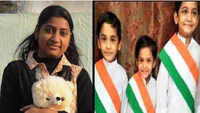Andhra girl detected with rare clotting disorder gets new lease of life in Bengaluru
Sunitha Rao R | TNN | Updated: Apr 24, 2019, 08:18 IST Navyashree R
Navyashree RBENGALURU: She was suffering from a rare bleeding disorder that affects one in 50 lakh people. In a person with factor XIII deficiency, blood does not clot and he or she bleeds continuously whenever there is a minor injury. The 12-year-old girl from Andhra Pradesh — one of the 300-odd such patients in India — was treated in Bengaluru recently.
Navyashree R from Andhra Pradesh was brought to MS Ramaiah Hospital with severe headache, vomiting and weakness in left hand and leg. She was diagnosed with factor XIII deficiency, a rare, genetic bleeding disorder characterised by deficiency of clotting factor XIII. Clotting factors are specialised proteins that are essential for the blood to clot properly.
A team consisting of Dr Sunil Furtado, neurosurgeon, Dr Rashmi P, paediatric hematologist and oncologist and Dr Karunakar BP, paediatrician, took up the girl’s case soon after she was admitted to the hospital on March 5.
On March 7, the girl underwent a surgery to remove a hidden clot in her brain. Prior to the procedure, she was administered 20 units of cryoprecipitate, a filtered human blood product with high concentration of clotting factors to normalise clotting. While the girl has gone home now, she has to take cryoprecipitate units every month without fail.
Navyashree, studying in class 7, is the elder daughter of Chamundeshwari K and K Ram Mohan Reddy from Kothapalli village near Kadapa. The parents were always conscious of her movements as even a simple fall could be detrimental.
As per her medical documents, she was diagnosed with the problem at birth, when the separation of the umbilical cord led to uncontrolled bleeding. While the parents were told by her doctors that she has to be on cryoprecipitate unit every month, the same was not followed regularly and this led to formation of a clot in her brain, said doctors.
Another limitation in treating Navya was the non-availability of factor XIII supplement in the form of injection. “The drug is unavailable in India, as there may not be more than 300 patients in the country suffering from this disorder,” said Dr Sunil Furtado.
Parents prevent consanguineous marriages
From the time they got to know about Navya’s problem, her parents have been preventing consanguineous marriages among their close relatives, friends and neighbours. “We don’t know what caused Navya this problem. May be because ours was a consanguineous marriage. I got married to my maternal uncle. There is lack of awareness about the problems faced by the next generation because of such marriages and that trend must stop,” said Chamundeshwari.
Navyashree R from Andhra Pradesh was brought to MS Ramaiah Hospital with severe headache, vomiting and weakness in left hand and leg. She was diagnosed with factor XIII deficiency, a rare, genetic bleeding disorder characterised by deficiency of clotting factor XIII. Clotting factors are specialised proteins that are essential for the blood to clot properly.
A team consisting of Dr Sunil Furtado, neurosurgeon, Dr Rashmi P, paediatric hematologist and oncologist and Dr Karunakar BP, paediatrician, took up the girl’s case soon after she was admitted to the hospital on March 5.
On March 7, the girl underwent a surgery to remove a hidden clot in her brain. Prior to the procedure, she was administered 20 units of cryoprecipitate, a filtered human blood product with high concentration of clotting factors to normalise clotting. While the girl has gone home now, she has to take cryoprecipitate units every month without fail.
Navyashree, studying in class 7, is the elder daughter of Chamundeshwari K and K Ram Mohan Reddy from Kothapalli village near Kadapa. The parents were always conscious of her movements as even a simple fall could be detrimental.
As per her medical documents, she was diagnosed with the problem at birth, when the separation of the umbilical cord led to uncontrolled bleeding. While the parents were told by her doctors that she has to be on cryoprecipitate unit every month, the same was not followed regularly and this led to formation of a clot in her brain, said doctors.
Another limitation in treating Navya was the non-availability of factor XIII supplement in the form of injection. “The drug is unavailable in India, as there may not be more than 300 patients in the country suffering from this disorder,” said Dr Sunil Furtado.
Parents prevent consanguineous marriages
From the time they got to know about Navya’s problem, her parents have been preventing consanguineous marriages among their close relatives, friends and neighbours. “We don’t know what caused Navya this problem. May be because ours was a consanguineous marriage. I got married to my maternal uncle. There is lack of awareness about the problems faced by the next generation because of such marriages and that trend must stop,” said Chamundeshwari.
Making sense of 2019
#Electionswithtimes
View Full Coverage



































All Comments ()+^ Back to Top
Refrain from posting comments that are obscene, defamatory or inflammatory, and do not indulge in personal attacks, name calling or inciting hatred against any community. Help us delete comments that do not follow these guidelines by marking them offensive. Let's work together to keep the conversation civil.
HIDE